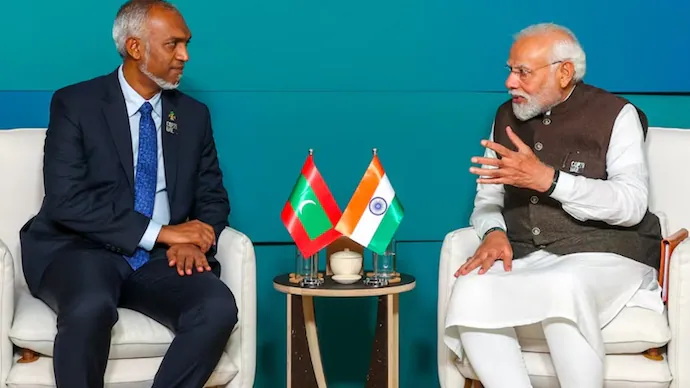The newly elected President of the Maldives, Mohamed Muizzu, has announced the introduction of India’s Unified Payments Interface (UPI) in the Maldives. This decision marks a pivotal step in strengthening the financial infrastructure of the island nation while enhancing the ease of digital transactions between the two countries. The introduction of UPI is expected to boost tourism, promote local businesses, and foster closer ties between the Maldivian and Indian economies.
UPI: Revolutionizing Payments
India’s UPI, launched in 2016 by the National Payments Corporation of India (NPCI), has revolutionized digital payments in India and has been recognized globally for its simplicity, speed, and interoperability. With over 10 billion transactions recorded monthly, UPI has transformed India into one of the fastest-growing digital economies. The system allows seamless, real-time transfers of money between bank accounts via mobile devices, eliminating the need for physical cash or cards. It integrates multiple banks under a single platform, allowing users to make transactions 24/7 using just a mobile phone number or a virtual payment address.
The Maldives’ decision to adopt UPI is part of a broader effort to modernize its financial services sector and move towards a cashless economy. With its tourism-dependent economy, the Maldives sees a substantial inflow of Indian tourists each year. The introduction of UPI will not only simplify transactions for tourists but also facilitate easier payments for local merchants and service providers, many of whom rely on cash-based transactions.
Strengthening Bilateral Relations
President Muizzu’s decision to introduce UPI in the Maldives underscores the close diplomatic and economic relationship between India and the Maldives. India has historically been one of the Maldives’ key economic partners, providing aid, investment, and technical assistance across various sectors. In recent years, this partnership has expanded to include collaboration in areas such as infrastructure development, healthcare, education, and now, digital payments.
By integrating India’s UPI system, the Maldives stands to benefit from India’s technological advancements in financial services. The move is expected to enhance cross-border trade and tourism, making it easier for Indian businesses and tourists to transact within the Maldivian economy. For India, the expansion of UPI into the Maldives serves as an important milestone in its efforts to internationalize the digital payment platform.
In recent months, India has been actively promoting UPI across several countries. Nations such as Singapore, the UAE, and Bhutan have already adopted UPI in some form, allowing cross-border transactions. The Maldives, being a major tourist destination for Indians, was a natural candidate for UPI’s expansion.
Impact on the Maldivian Economy
The Maldivian economy, primarily driven by tourism, will significantly benefit from the introduction of UPI. Indian tourists, who constitute one of the largest groups of foreign visitors to the Maldives, will find it easier to make payments for hotels, restaurants, and other services, as UPI will allow them to pay directly from their Indian bank accounts without needing to exchange currency. This ease of transaction is expected to enhance the overall tourist experience, potentially increasing tourist footfall from India.
Moreover, UPI will provide Maldivian businesses, especially small and medium enterprises (SMEs), with a secure, efficient, and cost-effective payment solution. Local merchants, who previously relied heavily on cash transactions, will be able to adopt digital payments, widening their customer base and increasing financial inclusion in the country.
For the Maldivian government, UPI offers an opportunity to advance its digital economy agenda. With UPI’s data-driven approach, the government will have better insights into consumer behavior and economic activity, allowing for more effective policy-making and financial regulation. Additionally, digital payments could improve tax collection and reduce the informal economy, further boosting government revenues.
Boost to Tourism and Trade
Tourism is the backbone of the Maldivian economy, and enhancing payment infrastructure for international visitors is a key priority for the government. The introduction of UPI will simplify the travel experience for Indian tourists, making it easier for them to pay for services and contribute to the local economy. This move is likely to strengthen Maldives’ standing as a preferred destination for Indian travelers, promoting tourism growth and generating foreign exchange revenue.
Furthermore, cross-border trade between India and the Maldives could also see a boost. With easier payment channels through UPI, Indian businesses and exporters will find it more convenient to engage in commercial activities with Maldivian enterprises. This enhanced connectivity between the two economies is expected to lead to more robust trade relations, benefiting both nations.
The decision by President Mohamed Muizzu to introduce India’s UPI in the Maldives is a landmark development in the digital payments landscape of the island nation. It signals a new chapter in the bilateral relationship between India and the Maldives, with far-reaching implications for trade, tourism, and financial inclusion. As UPI continues to expand beyond India’s borders, its introduction in the Maldives sets the stage for deeper regional cooperation and a more interconnected digital economy.

